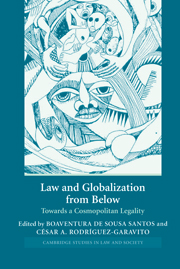Book contents
- Frontmatter
- Contents
- Notes on the contributors
- 1 Law, politics, and the subaltern in counter-hegemonic globalization
- PART ONE LAW AND THE CONSTRUCTION OF A GLOBAL ECONOMY OF SOLIDARITY
- 2 Beyond neoliberal governance: the World Social Forum as subaltern cosmopolitan politics and legality
- 3 Nike's law: the anti-sweatshop movement, transnational corporations, and the struggle over international labor rights in the Americas
- 4 Corporate social responsibility: a case of hegemony and counter-hegemony
- 5 Campaigning for life: building a new transnational solidarity in the face of HIV/AIDS and TRIPS
- 6 Negotiating informality within formality: land and housing in the Texas colonias
- 7 Local contact points at global divides: labor rights and immigrant rights as sites for cosmopolitan legality
- PART TWO TRANSNATIONAL SOCIAL MOVEMENTS AND THE RECONSTRUCTION OF HUMAN RIGHTS
- PART THREE LAW AND PARTICIPATORY DEMOCRACY: BETWEEN THE LOCAL AND THE GLOBAL
- Index
- References
2 - Beyond neoliberal governance: the World Social Forum as subaltern cosmopolitan politics and legality
Published online by Cambridge University Press: 07 July 2009
- Frontmatter
- Contents
- Notes on the contributors
- 1 Law, politics, and the subaltern in counter-hegemonic globalization
- PART ONE LAW AND THE CONSTRUCTION OF A GLOBAL ECONOMY OF SOLIDARITY
- 2 Beyond neoliberal governance: the World Social Forum as subaltern cosmopolitan politics and legality
- 3 Nike's law: the anti-sweatshop movement, transnational corporations, and the struggle over international labor rights in the Americas
- 4 Corporate social responsibility: a case of hegemony and counter-hegemony
- 5 Campaigning for life: building a new transnational solidarity in the face of HIV/AIDS and TRIPS
- 6 Negotiating informality within formality: land and housing in the Texas colonias
- 7 Local contact points at global divides: labor rights and immigrant rights as sites for cosmopolitan legality
- PART TWO TRANSNATIONAL SOCIAL MOVEMENTS AND THE RECONSTRUCTION OF HUMAN RIGHTS
- PART THREE LAW AND PARTICIPATORY DEMOCRACY: BETWEEN THE LOCAL AND THE GLOBAL
- Index
- References
Summary
INTRODUCTION
Elsewhere, I have argued that there are two forms of globalization: neoliberal globalization and what I call counter-hegemonic globalization, which has been challenging the former for some time (Santos 2002: Chapters 5, 9). Counter-hegemonic globalization I define as the vast set of networks, initiatives, organizations, and movements that fight against the economic, social, and political outcomes of hegemonic globalization, challenge the conceptions of world development underlying the latter, and propose alternative conceptions.
Counter-hegemonic globalization is focused on the struggles against social exclusion. Since social exclusion is always the product of unequal power relations, counter-hegemonic globalization is animated by a redistributive ethos in its broadest sense, involving redistribution of material, social, political, cultural, and symbolic resources. In this sense, redistribution is based both on the principle of equality and on the principle of recognition of difference. At stake is the struggle for equal exchanges and authority (rather than power) relations. Because unequal exchanges and power relations are crystallized in politics and law, counter-hegemonic globalization unfolds as political and legal struggles guided by the idea that hegemonic legal and political structures and practices can be challenged by alternative principles of law and politics. These alternative principles and the struggles for them I have called subaltern cosmopolitan politics and legality (Santos 2002).
- Type
- Chapter
- Information
- Law and Globalization from BelowTowards a Cosmopolitan Legality, pp. 29 - 63Publisher: Cambridge University PressPrint publication year: 2005
References
- 27
- Cited by



